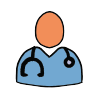DrBeen Articles
With 193 of videos in our articles, and new content being added weekly, we got you covered!
Category

The Best Ways to Help Your Teen With Anxiety
Helping a teen with anxiety involves several key strategies. Firstly, open communication is essential; encourage your teen to talk about their feelings without judgment. Educate yourself about anxiety to better understand what they’re experiencing. Teach them coping mechanisms such as deep breathing, mindfulness, and regular physical activity. Encourage a balanced lifestyle that includes proper sleep, nutrition, and limited screen time. Professional help, such as therapy, can be highly beneficial.

EKG – Difference Between MAT and PAT
An electrocardiogram (EKG) can differentiate between multifocal atrial tachycardia (MAT) and paroxysmal atrial tachycardia (PAT) based on their distinct patterns.

Liver Cirrhosis – Part I
Insult to liver on long run can cause fibrosis of the liver and formation of nodules ,which is termed as liver cirrhosis. Liver cirrhosis is a chronic condition of the liver in...

How Many Calories Should I Eat Daily?
The number of calories you should eat daily depends on several factors, including age, sex, weight, height, and activity level. Generally, adult women need about 1,800 to 2,400 calories per day, while adult men need about 2,200 to 3,000. More active individuals require more calories, whereas those with a sedentary lifestyle need fewer. To lose weight, a common approach is to reduce daily calorie intake by 500 to 1,000 calories to aim for a safe weight loss of about 1-2 pounds per week. It’s important to focus on nutrient-dense foods and consult with a healthcare provider for personalized advice.

Diabetes Mellitus and Glucose Peak
Diabetes mellitus is a chronic condition characterized by high blood glucose levels due to the body’s inability to produce or effectively use insulin. Managing glucose peaks, or postprandial spikes, is crucial for individuals with diabetes to prevent complications. These peaks occur after eating, and keeping them under control involves monitoring carbohydrate intake, choosing low-glycemic index foods, and adhering to a balanced diet.

Congestive Heart Failure (Part 3. Management)
Congestive heart failure (CHF) is a chronic condition where the heart is unable to pump blood effectively, leading to inadequate blood flow to meet the body’s needs. This results in the accumulation of fluid in the lungs, liver, abdomen, and lower extremities. Symptoms include shortness of breath, fatigue, swollen legs, and rapid weight gain due to fluid retention.
Pulmonary Circuit
Properties of Pulmonary Circuit The heart pumps a volume of blood into the lungs which after getting oxygenated is transported back to heart. This oxygenated blood is then pumped...

General Principles of Hemodynamics
Hemodynamics is the study of blood flow and its governing principles within the cardiovascular system. Blood flows from areas of high pressure to low pressure, driven by the heart’s pumping action, with the highest pressure in the arteries decreasing through capillaries and veins. Cardiac output, the volume of blood pumped by the heart per minute, is determined by heart rate and stroke volume.

Control of the Coronary Blood Flow
The control of coronary blood flow is essential for meeting the metabolic demands of the heart. It is regulated through a combination of mechanisms including metabolic, myogenic, and neural controls. Metabolically, coronary blood flow increases in response to elevated levels of metabolites like adenosine, which dilate the coronary vessels during heightened cardiac activity. Myogenic control involves the response of coronary vessels to changes in blood pressure, maintaining a consistent flow despite fluctuations.
Natural Selection
Introduction In the mid 19th century, Charles Darwin (1809 - 1882), formulated the scientific theory of evolution by natural selection, published in his book "On the origin of...
The Best Ways to Help Your Teen With Anxiety
Helping a teen with anxiety involves several key strategies. Firstly, open communication is essential; encourage your teen to talk about their feelings without judgment. Educate yourself about anxiety to better understand what they’re experiencing. Teach them coping mechanisms such as deep breathing, mindfulness, and regular physical activity. Encourage a balanced lifestyle that includes proper sleep, nutrition, and limited screen time. Professional help, such as therapy, can be highly beneficial.
EKG – Difference Between MAT and PAT
An electrocardiogram (EKG) can differentiate between multifocal atrial tachycardia (MAT) and paroxysmal atrial tachycardia (PAT) based on their distinct patterns.
Liver Cirrhosis – Part I
How Many Calories Should I Eat Daily?
The number of calories you should eat daily depends on several factors, including age, sex, weight, height, and activity level. Generally, adult women need about 1,800 to 2,400 calories per day, while adult men need about 2,200 to 3,000. More active individuals require more calories, whereas those with a sedentary lifestyle need fewer. To lose weight, a common approach is to reduce daily calorie intake by 500 to 1,000 calories to aim for a safe weight loss of about 1-2 pounds per week. It’s important to focus on nutrient-dense foods and consult with a healthcare provider for personalized advice.
Diabetes Mellitus and Glucose Peak
Diabetes mellitus is a chronic condition characterized by high blood glucose levels due to the body’s inability to produce or effectively use insulin. Managing glucose peaks, or postprandial spikes, is crucial for individuals with diabetes to prevent complications. These peaks occur after eating, and keeping them under control involves monitoring carbohydrate intake, choosing low-glycemic index foods, and adhering to a balanced diet.
Congestive Heart Failure (Part 3. Management)
Congestive heart failure (CHF) is a chronic condition where the heart is unable to pump blood effectively, leading to inadequate blood flow to meet the body’s needs. This results in the accumulation of fluid in the lungs, liver, abdomen, and lower extremities. Symptoms include shortness of breath, fatigue, swollen legs, and rapid weight gain due to fluid retention.
Pulmonary Circuit
General Principles of Hemodynamics
Hemodynamics is the study of blood flow and its governing principles within the cardiovascular system. Blood flows from areas of high pressure to low pressure, driven by the heart’s pumping action, with the highest pressure in the arteries decreasing through capillaries and veins. Cardiac output, the volume of blood pumped by the heart per minute, is determined by heart rate and stroke volume.
Control of the Coronary Blood Flow
The control of coronary blood flow is essential for meeting the metabolic demands of the heart. It is regulated through a combination of mechanisms including metabolic, myogenic, and neural controls. Metabolically, coronary blood flow increases in response to elevated levels of metabolites like adenosine, which dilate the coronary vessels during heightened cardiac activity. Myogenic control involves the response of coronary vessels to changes in blood pressure, maintaining a consistent flow despite fluctuations.

